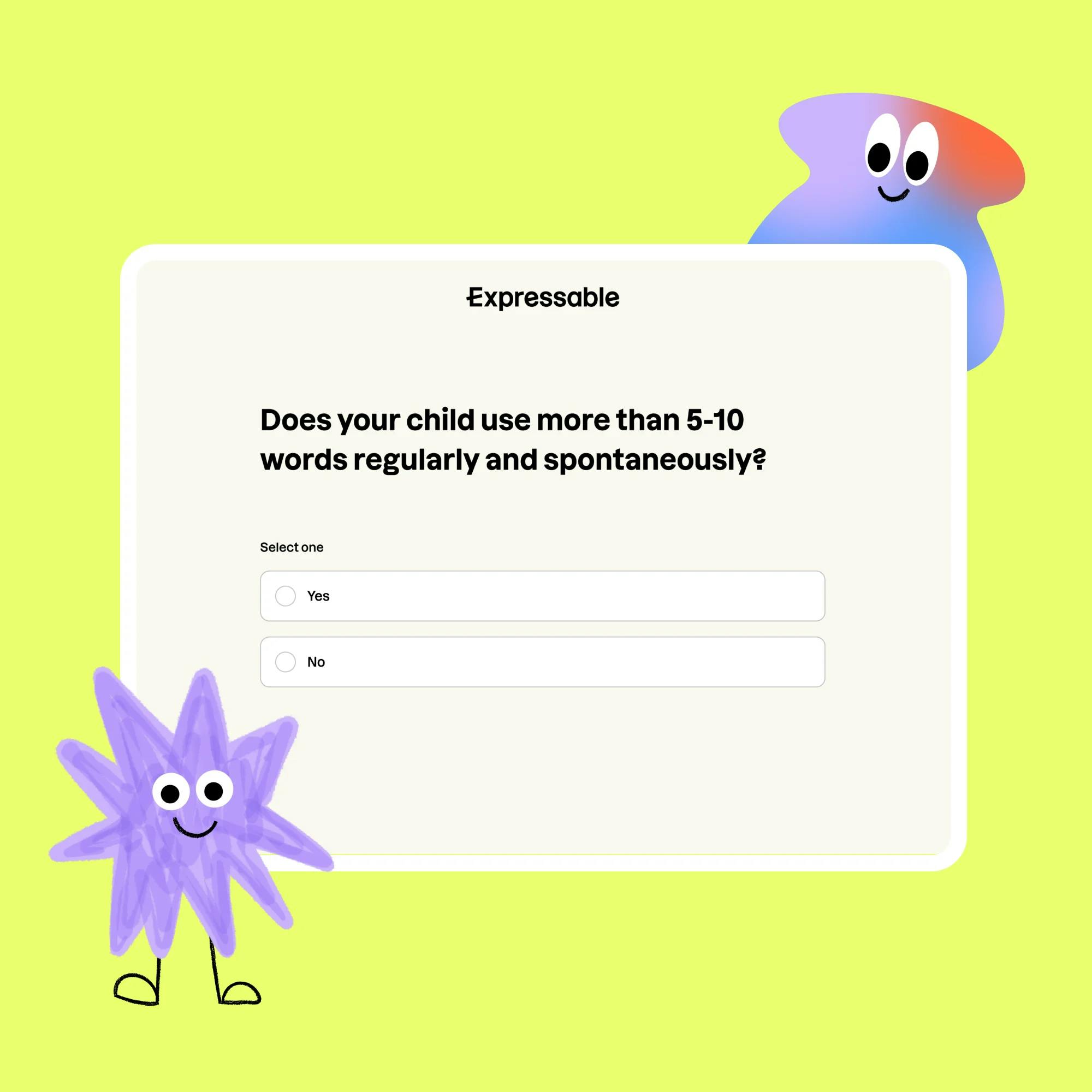
What Is a Speech Therapy Evaluation for Children and How to Prepare
 Abby Barnes, M.S., CCC-SLP
Abby Barnes, M.S., CCC-SLP
If you're looking to start your child in speech therapy, it's important to understand what a speech therapy evaluation is and how it works.
At Expressable, we see thousands of children every month for speech therapy evaluations, so we know a thing or two about them! Here’s everything you need to know about your child's evaluation, from how your child will be tested to a handy checklist to help you prepare.
Looking for a speech therapist?
Teletherapy makes it easy. We serve families with a range of speech, language, and feeding needs across the U.S. Get started today!
 Find a speech therapist
Find a speech therapistWhat is a speech therapy evaluation?
The main purpose of a speech therapy evaluation is to determine if a child needs speech therapy, and if so, what kind and how often. The evaluation is conducted by a speech-language pathologist, commonly known as a speech therapist. The evaluation can be done in-person or online via a video platform. It will involve some testing for your child, as well as conversation between you and the speech therapist about your child's current communication skills. That means both the child and a parent or caregiver need to attend the appointment.
Before the evaluation, the speech therapist will likely ask you to complete an intake form or questionnaire. This is a series of questions about your child's medical and birth history, their daily routine, and your concerns. Be as detailed as you can with your answers! This questionnaire provides valuable information that helps your speech therapist plan the testing for your child's evaluation. It also helps them determine whether referrals to another professional may be needed.


What happens during a speech therapy evaluation?
The speech therapy evaluation itself consists of tests and assessments focused on the areas of your child’s communication that you’re concerned about. The speech therapist may choose other related tests as well. The tests will be geared toward your child’s age, whether they’re a toddler, preschooler, or older child.
For example, a speech therapist may select an articulation assessment, such as the Goldman-Fristoe Test of Articulation, 3rd Edition (GFTA), for someone who is having trouble with the clarity of their speech. This test can be performed with very young children all the way up through adults. It assesses a person's ability to produce all the different sounds in speech. The speech therapist will show the child pictures that depict the words they want the child to say. This allows them to listen to the child's speech and phonetically transcribe how the child is saying each sound.
The Preschool Language Scale, 5th Edition, is a test aimed at children who have trouble understanding what others say to them or expressing what they want to say. If your child isn’t talking at an age-expected level, this test may be used during the evaluation. It can be used with infants all the way up through 7 years, 11 months. The Preschool Language Scale involves a series of questions that the speech therapist asks the child.
The speech therapist may have the child follow a series of directions, identify items, or explain a picture scene.
The therapist also uses toys and pictures to support what they’re asking the child to do. The speech therapist may have the child follow a series of directions, identify items, or even explain a picture scene or create a short story.
No matter which tests are used, the speech therapist observes the child’s responses and scores the tests. Many tests provide a numerical score, which the speech therapist can use to compare with other children the same age.
However, it’s important to know that these scores are just one part of the evaluation. The speech therapist will evaluate your child holistically as they speak and interact with them. They will also talk with you, the caregiver, in order to get a well-rounded assessment of your child’s current abilities and determine whether speech therapy is needed.

How can you prepare for your child's online speech therapy evaluation?
Follow this checklist to make the most out of your online evaluation with your speech therapist:
Plan to be available and involved in the session alongside your child.
Find a quiet space free of distractions and with good lighting.
Make sure you’re in a space with reliable internet.
Provide your child with comfortable seating and enough space to move around if needed.
Use a reliable computer or tablet. (A smartphone isn’t ideal, but you can use it if you don’t have a computer or tablet.)
Bookmark the Zoom link so it’s easy to find.
Feel free to log on to your session 5 to 10 minutes early so you can be fully ready at the start time.
Position the camera so the speech therapist can see your child’s face.
Close out any other running programs on the computer. Silence notifications.
If transitions are sometimes tough for your child, plan ahead. Try not to pull them away from a favorite activity just a few minutes before therapy begins. Give them plenty of notice before the session.


What happens after a speech therapy evaluation?
If speech therapy isn’t recommended, keep the speech therapist’s information in case you need it in the future. And consider the evaluation time well spent! It’s much better to rule out a need for speech therapy than to wait too long to get started.
If speech therapy is recommended, the therapist will explain how often your child should receive speech therapy sessions. For many children, this is twice a week. Some children with more severe needs may need speech therapy three times a week.
The purpose of a speech evaluation is also for the therapist to determine the starting point for therapy. Observing a child’s communication strengths and weaknesses helps the speech therapist know what goals to set for their therapy.
A speech evaluation helps the therapist determine the starting point for your child's therapy.
Speech therapy goals are written to be measurable and specific. Measuring a child’s success against a goal allows the speech therapist to keep track of the child’s progress. And keeping goals specific to the individual child helps ensure that what they’re working on exactly fits their needs.
A speech therapy goal may look something like this:
The client will demonstrate the ability to use 2-word phrases in 8 out of 10 opportunities across 3 consecutive sessions, in order to better communicate wants and needs.


How to know if your child needs a speech evaluation
Does your child need a speech therapy evaluation? It’s not always easy to be sure. But if you’re questioning it, there’s no harm in scheduling an evaluation. Sometimes it’s simply your intuition that starts the process. If this is where you find yourself, don’t wait. Find a speech therapist today! The earlier therapy starts, the better.
One way to determine if your child needs a speech evaluation is by paying attention to their overall speech and language development. Are they meeting developmental milestones? How do they compare to other kids their age? Look at communication milestone checklists as a general guide:
If your child hasn’t yet mastered some of the speech and language milestones expected for their age, reach out to a speech therapist.

How to get a speech therapy evaluation for your child
How can you find a speech therapist near you? Just like you’d research a new doctor before making an appointment, you should do the same for your child’s speech therapist. It’s always helpful to start by asking friends or acquaintances whose children have had speech therapy if they’d recommend their experience.
If you have health insurance, contact your plan to better understand their policies and coverage for speech therapy. Your health plan may have a list of in-network speech therapy providers that you can research.
This can also help you understand the cost of a speech therapy evaluation. There is not one set cost of a speech therapy evaluation; it will vary from place to place, and whether or not insurance is used. You can also speak with your child’s pediatrician to find someone to evaluate your child. They likely have a list of local speech therapy providers that they recommend. And you may need a pediatrician referral in order to be reimbursed for speech therapy by your health insurance.


Finally, there are several online directories where you can search speech therapists by location and qualifications. One of these directories is compiled by the American Speech-Language-Hearing Association, which is the professional credentialing organization for speech-language pathologists. No matter which route you take to finding a speech therapist for an evaluation, make sure to read any online reviews you find! And remember, you are in the driver's seat when it comes to the final choice. It should be someone who is licensed and experienced, and who connects well with your child.
What to know about starting speech therapy
If your child has received a speech evaluation and is going to start speech therapy, keep these things in mind. For some kids, it may take awhile to warm up to speech therapy. Others jump right in! But it’s perfectly normal for a child to need some time to get used to the new routine and develop a bond with their speech therapist. It’s important to know that progress may not be visible overnight. It’s unlikely that you’ll see a huge difference in your child’s skills after just one or two sessions. Speech and language progress takes time, but your speech therapist will be constantly monitoring it.
It’s important to know that speech therapy progress may not be visible overnight.
Your speech therapist may also notice progress in skills that seem small to you, but are actually important milestones. At any time, you should feel comfortable talking with your therapist about your child’s progress and asking any questions you have.
Speech therapy requires participation both during the session as well as outside the session. Your speech therapist should give you exercises, games, or other activities to practice with your child each week. These should be activities that you can easily fit into your everyday routine. Try to practice with your kiddo as often as you can. Kids learn best at home, with the people they love most. Speech and language progress happens much more quickly this way!


Schedule your child's speech therapy evaluation
Get started with Expressable by clicking here. You'll learn more about online speech therapy and whether it's covered by your insurance, if applicable. We'll also match you with a speech therapist who's right for your child. The sooner you start, the sooner your child will start to make progress!
How Expressable Can Help
Concerned your child isn't reaching age-expected milestones? Looking for communication support from a professional? Expressable is a national online speech therapy practice serving children and adults. We treat all major areas of communication and feeding, offer flexible hours including evenings and weekends, and accept most major health insurance plans. We’re proud to have earned more than 3,000 5-star reviews from our clients (4.9/5 average).
Our therapy model is centered on parent and caregiver involvement. Research proves that empowering caregivers to participate in their loved one’s therapy leads to better outcomes. That’s why we combine live, 1-on-1 speech therapy with personalized education and home practice activities for faster progress.
Communication is more than words. It’s how we share how we feel and show who we are. We’re here to help you or your child do just that.











